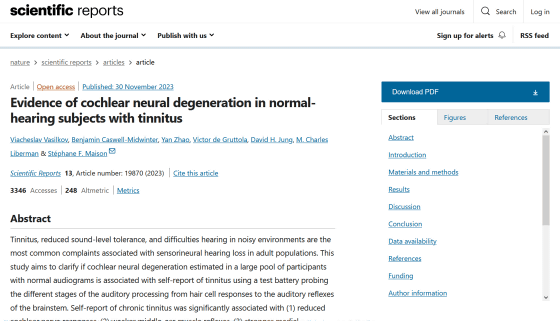Research results show that ``tinnitus'' may be the result of the brain trying to deal with auditory nerve problems

Evidence of cochlear neural degeneration in normal-hearing subjects with tinnitus | Scientific Reports
https://www.nature.com/articles/s41598-023-46741-5

Loss of auditory nerve fibers uncovered in | EurekAlert!
https://www.eurekalert.org/news-releases/1009360
Tinnitus Could Be Our Brain's Way of Coping With Nerve Damage : ScienceAlert
https://www.sciencealert.com/tinnitus-could-be-our-brains-way-of-coping-with-nerve-damage
Most tinnitus is temporary, but some people experience chronic tinnitus for more than three months. Dr. Stephen Mason, principal investigator at Mass Eye and Ear, said: ``Tinnitus is not just an unpleasant, persistent sound, but the symptoms are debilitating for many patients, leading to sleep deprivation and social 'It causes isolation, anxiety, and depression, negatively impacts work performance, and significantly reduces quality of life,' he said, pointing out that the negative effects of tinnitus are significant.
Tinnitus is generally associated with ear disorders such as noise exposure, hearing loss, injury, ear blockage, and infection. The process by which tinnitus occurs is not well understood, but the leading theory is that the sound can be heard in the absence of physical vibrations, resulting in a problem with the nerves that transmit sound information to the brain. About.
Proponents of this theory believe that tinnitus occurs when the brain tries to compensate for hearing loss or damage to the auditory nerve by picking up sounds when there is no sound at all. However, this theory has been challenged because many patients who experience chronic tinnitus have hearing loss, but some have no abnormalities on hearing tests.

Mason's research team conducted a study to analyze tinnitus symptoms and auditory nerve damage in 294 subjects aged 18 to 72 who had no abnormalities on hearing tests. In the current study, 29 participants had chronic tinnitus for more than 6 months, 64 had less than 6 months of tinnitus or temporary tinnitus after exposure to noise, and the remaining participants had He had never experienced tinnitus.
The analysis found that the subjects who experienced tinnitus despite having normal hearing had Cochlear synaptopathy, which is damage to the cochlear nerve that sends sound information to the brain. It became clear. Although cochlear neurodegeneration does not involve damage to
It has also been reported that the severity of tinnitus is an important predictor of cochlear neurodegeneration, and that patients with chronic tinnitus exhibit increased brainstem activity.
Mason said the findings reinforce the idea that tinnitus is caused by damage to the auditory nerve, even in people with normal hearing. 'Tinnitus cannot be cured unless we fully understand the mechanism behind it. This research is the first step toward the ultimate goal of eliminating tinnitus.'

Related Posts:
in Science, Posted by log1h_ik







